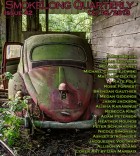Jay had a statue of Kwan Yin, and whenever you moved the statue, you had to say a special mantra to help her feel at home in a strange place. The mantra was quite long, nine lines, and if you messed up in the middle you were supposed to go back.
Whenever he ran the vacuum—that, at least, he would do—he lifted up Kwan Yin, chanted the mantra over the whine of the nearly dead Dirt Devil, swept the dusting attachment under her, set her down again and said the mantra again. Sometimes, he forgot to screw the dust brush on before he lifted her, and would realize mid-mantra—”Oi—sha—om—shanti—shit, I’ve forgotten the fucking attachment!” And he’d start again from the beginning, set her down, say the mantra, change from the crevice tool to the dust brush, pick her up, say the mantra, vacuum her pedestal, set her down again, say the mantra again.
Sometimes, when Jay was at work, I would rotate Kwan Yin slightly to the left, leave her there for a minute and rotate her back, hoping to disorient her. Or eat the candies from her offering bowl, desperate for a mint because they were there, then run to the corner market and buy oranges or peaches or today a whole pineapple, hoping that the gaudiness of the gift will distract Jay from wondering where the previous bowl, laid out with yet another mantra, has gone.
“Why is there a pineapple on the altar?” he asks as he comes through the door, logbook still in hand, tie unloosened, me unkissed.
“I saw it at the market and the green top looked really joyful.”
Usually, joy is good enough.
“Well, she can’t see.”
“She’s a goddess, Jay. Her vision cannot be blocked by pineapple.”
“How do you expect her to bring kindness to the flat if all she can see is bloody leaves?”
He’s already at the altar, full mantra ahead, pineapple borne off to the kitchen, topped, sliced, peeling off the thick rind in his shirtsleeves and tie. I wait, respectfully, while he mantras the pineapple back into the offering bowl.
My job is to wait, respectfully, for the mantra to finish, for my visa to come through, for someone to take a chance and sponsor me. I want to work under the table. I want to clean toilets or serve beer or mind babies or do any of the hundred things I hate slightly less than sitting in the flat, waiting. Jay will not hear of my working illegally. He works “for the government.” It could “jeopardize his position,” driving a tube train, often while stoned. “You should see the tunnels coming towards you. Like the whole world is falling.” He wants to try it on acid one day. I take the bus as often as possible.
Jay’s pupils are huge when he comes home from work, big black holes. If I looked hard enough, if I looked with the eyes of Kwan Yin, I could see his heart and whether or not he is also just playing along until I can move. Whether this is nirvana, you are here, or just śūnyatā, nothingness.
He finishes with the pineapple and reaches into his bag, pulls out and unwraps a builder’s brick from paper, a brown rectangle with a gold seal. I am unenlightened until he says, “Hash, luv. Sell this to the other drivers, that’s the lolly.” He takes it into the kitchen and saws the end off with a paring knife, mantras the chunk—”Street maybe fifty quid, nothing too good for you, my girl”—into Kwan Yin’s bowl, next to the pineapple, then sits on the carpet and gazes up at her with adoration. I meet her eyes over his head.
The landlord stands in the door with a mouth like a change purse snapped shut. The builder’s brick was three months rent, the last three months. We have an hour. I am already packed, already planning the route to the phone box where I will call the airline and tell them someone has died so I can afford to fly home. Jay is wrapping sacred objects in silk and carefully removing wall hangings, rolling and placing, rolling and placing, the statues and pictures filling a box as the landlord reminds him, “twenty minutes, lad, out you go.” There is a mantra for the movement of sacred objects, almost as long as the one for Kwan Yin, and Jay doggedly goes through it, item by item. I grab Kwan Yin and her dishes and smother her in newspaper, stuff her in the corner of the box, where I do, in fact, hope she won’t break.



 The core workshop of SmokeLong Fitness is all in writing, so you can take part from anywhere at anytime. We are excited about creating a supportive, consistent and structured environment for flash writers to work on their craft in a community. We are thrilled and proud to say that our workshop participants have won, placed, or been listed in every major flash competition. Community works.
The core workshop of SmokeLong Fitness is all in writing, so you can take part from anywhere at anytime. We are excited about creating a supportive, consistent and structured environment for flash writers to work on their craft in a community. We are thrilled and proud to say that our workshop participants have won, placed, or been listed in every major flash competition. Community works.